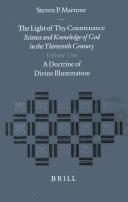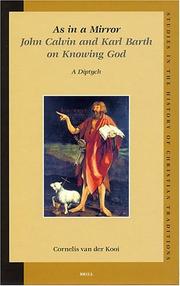| Listing 1 - 4 of 4 |
Sort by
|
Multi
ISBN: 9781107685949 9780521769204 9781139032797 9781139190411 1139190415 1139032798 9781139187824 1139187821 9781107225305 1107225302 0521769205 9786613378521 6613378526 9781283378529 1283378523 1139179497 9781139179492 1139189107 9781139189101 1139183192 9781139183192 1139185519 9781139185516 110768594X Year: 2012 Publisher: New York Cambridge university press
Abstract | Keywords | Export | Availability | Bookmark
 Loading...
Loading...Choose an application
- Reference Manager
- EndNote
- RefWorks (Direct export to RefWorks)
"In this chapter I argue for a reassessment of current academic opinion regarding the theme of the spiritual senses in the writings of Origen of Alexandria (c. 185--c. 254). Specifically, John Dillon has claimed that it is exclusively in Origen's late works that one finds a 'proper' doctrine of the spiritual senses (the crucial features of which will be discussed below).1 Dillon argues that Origen's early works, by contrast, evince only a metaphorical use of the language of sensation.2 The early Origen, according to this reading, is not actually describing the perception of spiritual realities, as is typically thought. Instead, in his early writings Origen uses terms such as 'seeing' and 'hearing' in a figurative manner to describe 'understanding', placing no particular value on the sensory dimension to the terms. In contrast to this assessment, however, I argue here that unexamined aspects of Origen's early writings in fact demonstrate noteworthy continuities between his early and late uses of sensory language. In particular, portions of Origen's early scriptural commentaries and Deprincipiis show that his 'doctrine of the spiritual senses' emerges much earlier than has been recently supposed"-- "Is it possible to see, hear, touch, smell and taste God? How do we understand the biblical promise that the 'pure in heart' will 'see God'? Christian thinkers as diverse as Origen of Alexandria, Bonaventure, Jonathan Edwards and Hans Urs von Balthasar have all approached these questions in distinctive ways by appealing to the concept of the 'spiritual senses'. In focusing on the Christian tradition of the 'spiritual senses', this book discusses how these senses relate to the physical senses and the body, and analyzes their relationship to mind, heart, emotions, will, desire and judgement. The contributors illuminate the different ways in which classic Christian authors have treated this topic, and indicate the epistemological and spiritual import of these understandings. The concept of the 'spiritual senses' is thereby importantly recovered for contemporary theological anthropology and philosophy of religion"--
Senses and sensation --- Religious aspects --- Christianity. --- 231.133.11 --- -Sensation --- Sensory biology --- Sensory systems --- Neurophysiology --- Kenbaarheid van God --- -Kenbaarheid van God --- 231.133.11 Kenbaarheid van God --- -231.133.11 Kenbaarheid van God --- Sensation --- Knowledge, Theory of --- Psychophysiology --- Perception --- Religious aspects&delete& --- Christianity --- Christian church history --- Christian spirituality --- God (Christianity) --- Theological anthropology --- Knowableness. --- History of doctrines. --- Man (Christian theology) --- Knowableness of God --- Knowledge of God (Knowableness of God) --- Knowledge (Knowableness) --- Arts and Humanities --- Religion --- Senses and sensation - Religious aspects - Christianity.

ISSN: 00818607 ISBN: 9004120645 9004119477 9004120653 9786610464517 1417536632 1280464518 9047400666 9781417536634 9789047400660 9789004119475 9789004120648 9789004120655 Year: 2001 Volume: 98 Publisher: Leiden Boston Brill
Abstract | Keywords | Export | Availability | Bookmark
 Loading...
Loading...Choose an application
- Reference Manager
- EndNote
- RefWorks (Direct export to RefWorks)
This work documents the development of scholastic argumentation in 13th century Europe. It traces the rise of a formal model of science and resulting accommodations in traditional attitudes towards human cognition, especially with regard to the role of divine illumination.
God (Christianity) --- Knowledge, Theory of (Religion) --- Religion and science --- Knowableness --- History of doctrines. --- History. --- Thirteenth century. --- Dertiende eeuw --- Thirteenth century --- Treizième siècle --- 231.133.11 --- -Religion and science --- -Thirteenth century --- God --- -13th century --- Middle Ages --- 231.133.11 Kenbaarheid van God --- Kenbaarheid van God --- Christianity and science --- Geology --- Geology and religion --- Science --- Science and religion --- Religious knowledge, Theory of --- Religion --- Theology, Doctrinal --- Metaphysics --- Misotheism --- Monotheism --- Theism --- History --- -History of Doctrines --- Religious aspects --- Philosophy --- Epistemology, Religious --- Religious epistemology --- Christianity --- Trinity --- Knowableness&delete& --- History of doctrines --- History of controversy --- 13th century --- God (Christianity) - Knowableness - History of doctrines. --- Knowledge, Theory of (Religion) - History. --- Religion and science - History.

ISBN: 900413817X 9786610859894 1429426985 9047405226 128085989X 1433703858 9789004138179 9781429426985 9781433703850 6610859892 9789047405221 Year: 2005 Volume: 120 Publisher: Leiden Brill
Abstract | Keywords | Export | Availability | Bookmark
 Loading...
Loading...Choose an application
- Reference Manager
- EndNote
- RefWorks (Direct export to RefWorks)
What does it really mean, to know God? What are the grounds for knowing God, what feeds that knowledge, and what is really known? In his search for answers to these questions, in two panels the author paints for us a clear picture of what Calvin and Barth had to say about knowing God: Calvin against the background of pre-modern culture, Barth in response to a post-Kantian culture inclined to agnosticism. Between them, like a hinge between the two panels, we find the philosophy of Kant. The two epochal theological figures are placed next to each other, but without this being at the expense of the power of either. The study does not stop with detached historical analysis, but nourishes the author's own reflection toward a systematic design.
231.133.11 --- 2 BARTH, KARL --- 2 CALVIN, JEAN --- 231.133.11 Kenbaarheid van God --- Kenbaarheid van God --- 2 CALVIN, JEAN Godsdienst. Theologie--CALVIN, JEAN --- Godsdienst. Theologie--CALVIN, JEAN --- 2 BARTH, KARL Godsdienst. Theologie--BARTH, KARL --- Godsdienst. Theologie--BARTH, KARL --- God (Christianity) --- Christianity --- Trinity --- Knowableness&delete& --- History of doctrines --- Barth, Karl, --- Calvin, Jean, --- Calvijn, Johannes --- Calvin, Jean --- Calvinus, Johannes --- Parŭtʻŭ, Kʻal, --- Barth, Karol, --- Barŭtʻŭ, Kʻal, --- Barŭtʻŭ, --- Bate, --- בארת, קרל, --- カール·バルト, --- 巴特, --- Contributions in knowableness of God --- Barth, Karl --- God --- Knowableness --- History of doctrines. --- Godsleer --- Godsleer.
Book
ISBN: 1575063980 9781575063980 1575063972 9781575063973 9781575063973 Year: 2015 Publisher: Winona Lake Eisenbrauns
Abstract | Keywords | Export | Availability | Bookmark
 Loading...
Loading...Choose an application
- Reference Manager
- EndNote
- RefWorks (Direct export to RefWorks)
Few phrases in Scripture have occasioned as much discussion as has the “I am who I am” of Exodus 3:14. What does this phrase mean? How does it relate to the divine name, YHWH? Is it an answer to Moses’ question (v. 13), or an evasion of an answer?The trend in late-nineteenth- and twentieth-century scholarly interpretations of this verse was to superimpose later Christian interpretations, which built on Greek and Latin translations, on the Hebrew text. According to such views, the text presents an etymology of the divine name that suggests God’s active presence with Israel or what God will accomplish for Israel; the text does not address the nature or being of God. However, this trend presents challenges to theological interpretation, which seeks to consider critically the value pre-modern Christian readings have for faithful appropriations of Scripture today.In “Too Much to Grasp”: Exodus 3:13?15 and the Reality of God, Andrea Saner argues for an alternative way forward for twenty-first century readings of the passage, using Augustine of Hippo as representative of the misunderstood interpretive tradition. Read within the literary contexts of the received form of the book of Exodus and the Pentateuch as a whole, the literal sense of Exodus 3:13–15 addresses both who God is as well as God’s action. The “I am who I am” of v. 14a expresses indefiniteness; while God reveals himself as YHWH and offers this name for the Israelites to call upon him, God is not exhausted by this revelation but rather remains beyond human comprehension and control.
God --- God (Christianity) --- God (Judaism) --- Name --- Biblical teaching. --- Biblical teaching --- Bible. --- Chʻuraegŭpki (Book of the Old Testament) --- Exodus (Book of the Old Testament) --- Khurūj --- Kitāb-i Shimūt (Book of the Old Testament) --- Shemot --- Sifr al-Khurūj (Book of the Old Testament) --- Criticism, interpretation, etc. --- 231.133.11 --- 231.12 --- 222.3 --- 221.06 --- 222.3 Exodus. Leviticus. Numeri --- 222.3 L'Exode. Le Lévitique. Les Nombres --- Exodus. Leviticus. Numeri --- L'Exode. Le Lévitique. Les Nombres --- 221.06 Oud Testament: hermeneutiek; exegese --- Oud Testament: hermeneutiek; exegese --- 231.12 Wezen van God --- Wezen van God --- 231.133.11 Kenbaarheid van God --- Kenbaarheid van God --- Metaphysics --- Misotheism --- Theism --- Name&delete& --- Gegenwart Gottes --- Bibel --- Shemos --- Gott --- Gottesgegenwart --- Göttliche Gegenwart --- Allgegenwart Gottes --- Einwohnung Gottes --- Schekina --- Gegenwart
| Listing 1 - 4 of 4 |
Sort by
|

 Search
Search Feedback
Feedback About UniCat
About UniCat  Help
Help News
News